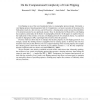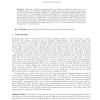150 search results - page 13 / 30 » Fair Secure Two-Party Computation |
FOCS
2010
IEEE
13 years 5 months ago
2010
IEEE
Coin flipping is one of the most fundamental tasks in cryptographic protocol design. Informally, a coin flipping protocol should guarantee both (1) Completeness: an honest executi...
EDCC
2005
Springer
14 years 1 months ago
2005
Springer
The fair exchange problem is key to trading electronic items in systems of mutually untrusted parties. In modern variants of such systems, each party is equipped with a security mo...
CSIE
2009
IEEE
14 years 2 months ago
2009
IEEE
Customers are usually passive in an electronic commerce transaction. Based on a new two times concurrent signature, this article presents a fair electronic payment (E-payment) pro...
TCC
2009
Springer
14 years 8 months ago
2009
Springer
It is well known that general secure function evaluation (SFE) with information-theoretical (IT) security is infeasible in presence of a corrupted majority in the standard model. ...
EUROCRYPT
2004
Springer
14 years 27 days ago
2004
Springer
Informally, a public-key steganography protocol allows two parties, who have never met or exchanged a secret, to send hidden messages over a public channel so that an adversary can...


